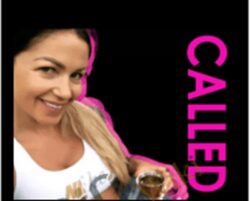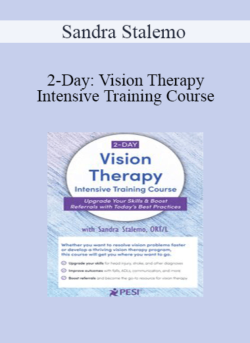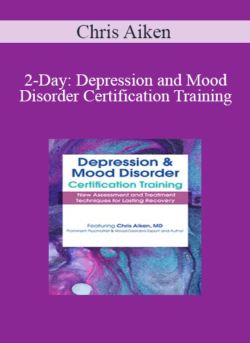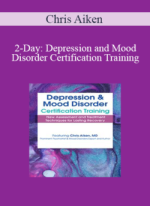[Instant Download] – Immediately deliver the download link after receiving the paymentPurchase Chris Aiken – 2-Day: Depression and Mood Disorder Certification Training: New Assessment and Treatment Techniques for Lasting Recovery courses at here with PRICE $439.99 $83Faculty:Chris AikenDuration:14 Hours 49 MinutesFormat:Audio and VideoCopyright:Dec 15, 2020www.evergreencertifications.com/CDMDTP for details.Purchase today and leave confident that your treatment toolbox has the right combination of clinical interventions so your clients can find relief and live the lives they deserve!Handouts Extra Handouts – 2-Day Depression & Mood Disorder Certification Training (3.2 MB) 33 Pages Available after Purchase Manual Day 1 – 2-Day Depression & Mood Disorder Certification Training (26.2 MB) 110 Pages Available after Purchase Manual Day 1 with slide notes – 2-Day Depression & Mood Disorder Certification Training (73.5 MB) 212 Pages Available after Purchase Manual Day 2 with slide notes-2-Day Depression & Mood Disorder Certification Training (16 MB) 285 Pages Available after Purchase Outline The Mood Spectrum: Diagnosis in the DSM-5™ Era Major Depressive DisorderPersistent Depressive DisorderDepression with Mixed FeaturesCyclothymic DisorderBipolar II DisorderBipolar I DisorderSpecifiers: Anxious distress, melancholic, atypical, seasonal & peripartum moodsMania, hypomania, mixed states: How to recognize eachDifferential diagnosis: Anxiety, addiction, ADHD, eating disorders, substance abuseBipolar Disorder or Borderline Personality Disorder?Assessment: Practical Tips, Evidence-Based Tools, and Subclinical Features How to avoid over-diagnosingEvidence-based measures: MINI-7; PHQ-9, MDQ, Bipolarity Index, & Hypomania ChecklistWhy traditional mood charting doesn’t work – and what to do insteadAffective temperaments: Depressive, Hyperthymic, Cyclothymic and IrritableRumination, cognitive deficits, and early warning signsConceptualizing mood through the lens of energy, not emotionClassic v. atypical Bipolar DisorderWhen mood is shaped by traumaTHERAPY FOR MOOD DISORDERS: FROM EVIDENCE-BASED TREATMENTS TO A PERSONALIZED PLAN Mood Disorder Must-Haves for Every Treatment PlanPsychoeducation – reduce stigma, identify causes, focus on preventionPsychotherapy – how to match mood with the approachConcrete interventions – create a “menu” the client can choose fromPositive psychology: the unique strengths of mood disordersFamily therapy – communication skills, boundaries, crisis plansRemediation strategies for building back cognitive skills deficitsBehavioral Activation: More Than Building a Busy ScheduleNeuroscience: Turning down the brain’s default mood networkIntegrating values and meaning in behavioral changeHow behavior challenges depressive beliefsStrategies: Opposite action, approach-avoidance, mindful mediaRumination-Focused CBT (RF-CBT)How is RF-CBT different from traditional CBT?Useful v. dysfunctional ruminationThe benefits of ruminationShift from avoidant rumination to absorbing actionThe neurobiological basis of RF-CBTStrategies: Chain analysis, habit changing, immersion, mindfulness and compassionate thoughtCognitive Behavioral Analysis System of Psychotherapy (CBASP)An attachment-based approach to treating mood disordersPreoperational thinking: Why chronic depression is slow to changePositive and negative reinforcement in chronic depressionEvidence to support CBASP for chronic depressionStrategies: Interpersonal inventory, situational analysis, interpersonal discriminationSocial Rhythm TherapyTherapy with a biological basisFour routines that stabilize the biological clockCircadian rhythms, neurohormones and neuroplasticityStrategies: Brisk awakening, zeitgebers, social rhythm chartCognitive Behavioral Therapy for InsomniaHow a therapy for sleep treats depressionSleep drive and circadian rhythmsThe vicious cycle of anxiety and insomniaBasic steps: Sleep hygieneAdvanced moves: Bed restrictionSpecial situations: Screen time, jet-lag, napping, night owls, and shift workAn Antidepressant LifestyleNutrition: The MediMod Diet, probiotics, caffeine, alcohol and sugarPhysical Activity: When, where, how muchEnvironment: Dawn simulation, light and dark therapies, nature, music, aromatherapy and air ionizationMedicationWhy a clear diagnosis is crucial before starting any medicationAnti-depressants and mood stabilizers: New classes, old standardsBenefits, risks, side effects; how to recognize problemsHow medication impacts therapy: State-dependent learningThe Medication Interest Model: A Motivational Interview for Medication AdherenceTop supplements for mood disorderBeyond medication: Transcranial Magnetic Stimulation, Electroconvulsive Therapy, esKatamineCrisis Intervention The therapeutic relationship with the suicidal clientA collaborative approach to risk assessmentWhich symptoms warrant hospitalization?CBT for Suicidality: How therapy can present suicideStrategies: Hope box, coping cards, and distress tolerance skillsEmergency planningClinical ConsiderationsCountertransference issues in depression and maniaStaying within your scope of practiceChildren and adolescents: DMDD v. Bipolar DisorderMulticultural considerationsFacultyChris Aiken, M.D. Related seminars and products: 2 Chris Aiken, M.D., is a psychiatrist who specializes in natural and behavioral approaches to mood disorders. He is the editor-in-chief of the Carlat Psychiatry Report, section editor for Psychiatric Times, and the host of The Natural Mind podcast. His books include Bipolar, Not So Much, The Depression and Bipolar Workbook, and Drug Metabolism in Psychiatry. His work has been cited in the International Encyclopedia of Depression, and he is involved in clinical research to identify new treatments for mood disorders. He maintains a private practice through the Mood Treatment Center and teaches at the Wake Forest University School of Medicine.Speaker Disclosures:Financial: Chris Aiken is director and founder of Mood Treatment Center. He receives royalties as an author for WW Norton; and PESI Publishing & Media. Dr. Aiken receives a speaking honorarium from PESI, Inc.Nonfinancial: Chris Aiken is a Distinguished Fellow of the American Psychiatric Association. He is a member of the North Carolina Psychiatric Association; Forsyth County Psychiatric Association; and the International Society for Bipolar Disorders. Salepage: https://catalog.pesi.com//item/2day-depression-mood-disorder-certification-training-assessment-treatment-techniques-lasting-recovery-73361Archive: https://archive.ph/wip/j5DX9Purchase Chris Aiken – 2-Day: Depression and Mood Disorder Certification Training: New Assessment and Treatment Techniques for Lasting Recovery courses at here with PRICE $439.99 $83
 Katrina Ruth Programs – Called
₹15,106.00
Katrina Ruth Programs – Called
₹15,106.00
 Sandra Stalemo – 2-Day: Vision Therapy Intensive Training Course: Upgrade Your Skills & Boost Referrals with Today’s Best Practices
₹13,778.00
Sandra Stalemo – 2-Day: Vision Therapy Intensive Training Course: Upgrade Your Skills & Boost Referrals with Today’s Best Practices
₹13,778.00
Chris Aiken – 2-Day: Depression and Mood Disorder Certification Training: New Assessment and Treatment Techniques for Lasting Recovery
₹13,778.00




